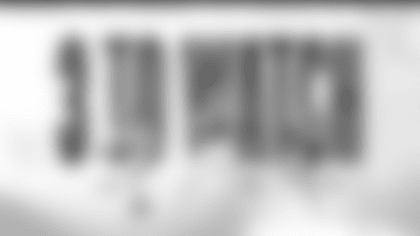[

]()
Q: When you take over a new team, what are some of the first things you want to do?
DG: I think that always the first thing is attitude, and you try to create a positive atmosphere. Attitude is atmosphere. Then [you] try to have an environment where players and coaches have some clear-cut goals for themselves. To do that, you have to have a certain amount of change. Some of the players that were on the team last year will be back. Some of the players that were on the team won't be back. You add some new players [and] make sure you draft the right guys that fit that kind of mentality. Then you have to hang in there because you don't make those kinds of changes and have success on a program that has not been successful overnight.
Q: What do you see for the Cardinals in the future? Will all of the new faces fit in around there?
DG: I think they will. When I went into Minnesota in 1992, we had 21 players that were on the roster in 1991 that were not on the roster in 1992 when we got there. But most people forget what Green Bay was like before Mike Holmgren. Green Bay had 28 new players. Both programs had to be turned around. Both programs had winning records. But you don't change for change's sake. You change because many times the lack of success is a tie-in to a lot of things. With a new staff, you probably should work pretty hard at converting a lot of players, and the guys that are not convertible you have to replace them.
Q: What do you think about the Patriots?
DG: I think first off they play really well as a team. I think if you look at the way the program is put together, they have very talented linemen that play together really well. I don't know if any of them are well known, but they play together extremely well. Matt Light and [Tom] Ashworth, you see those guys passing people off. They do a great job. Tom Brady is outstanding at quarterback. He's a winner. We took John Navarre in the seventh round this year, and the first thing I asked him was why nobody in the NFL respects Michigan quarterbacks. He kind of got a chuckle out of it because Navarre was a very good player at Michigan, won a lot of games, broke a lot of records. Tom Brady won a lot of games at Michigan. Elvis Grbac, [Brian] Griese, there have been a lot of very talented quarterbacks out of Michigan. I don't think they get nearly the respect they should have. I think one of the major things they come with is not just size, because they like them big there, but also that real winning attitude. That's what Brady has. You combine that with an incredible speed…we just played what's called the greatest show on artificial turf, which is the St. Louis Rams [who have] a lot of receivers, a lot of speed. But I tell you what, I think if you take [David] Givens, [Deion] Branch, David Patten and Bethel Johnson and have a four by four relay team, you can leave out P.K. Sam and Troy Brown, I think that there's nobody in the National Football League that can run with the four guys that they have. So that speed combination gives them a phenomenal offense, and of course you haven't even mentioned the defense yet.
Q: What makes Emmitt Smith still run?
DG: I think the drive. I came and I didn't have a clue if Emmitt was interested in retiring or staying. We sat down and talked. He told me he wanted to play again. I told him, 'Great' because I have a lot of respect for him. We've had Hall of Fame-type players in San Francisco, and we've had Hall of Fame-type players at Minnesota. They normally have the same ingredient, which is a drive to be successful. Emmitt was as good, probably as good as anyone in the winter weight-training program, seven o'clock weights, running, doing a great job of that. As a result of that practice, [during] training camp he never missed a day. I think he's ready to go out and have a really solid year. Now, with that being said, I'm just hoping that the line, the backs, the tight ends, will appreciate him a little bit more and be a lot more aggressive with their run blocking because Emmitt can find creases. He can find seams in defenses, and if you stay on your block he can get through those.
Q: Can you talk about the progress and development of Larry Fitzgerald?
DG: He missed three weeks, four weeks of work, and I think that made it difficult for him but he came back ready to play. I think he worked hard. As you know, ankles can be very difficult. It probably will bother him all year. An ankle won't get better until you give it about two months rest, and he can't do that. So, I just think that he's got good hands. He can expand the field. He's got a big, strong body. He should play better this week than he did last week because that was really his first performance in over a month.
Q: You knew Fitzgerald when he was a boy, didn't you?
DG: Yes, a young guy. I knew him when he was about eight, nine years old. He wanted to be a ball boy. I said, 'Hey, you have to be at least 12.' When he turned 12 he came and was bugging me again about being a ball boy. So, he was outstanding at it, did a good job, a very detail- oriented guy. His brother was bugging me the same way. Now Marcus [Fitzgerald], when he got to be 12 he was a ball boy also, he's a wide receiver at Marshall University. The guys do a great job. Their dad and mom did a great job of raising them. [Larry] comes with a high level of expectations and is a winner.
Q: As an opposing coach, how does Corey Dillon change the look of the Patriots' offense?
DG: Well, I think any time he's on the field you have to be concerned. We just came from a walk-through before we practice this afternoon, and I said it plain and simple, 'This guy, if you don't tackle him [with] more than one guy, he's going to kill you.' I think that as long as he's there, you're going to eyeball him. When he's on the field you're going to eyeball him. It makes it difficult because a lot of times he's on the field and not getting the ball, and they will play-action fake and so forth. I just say when they go with two tight ends and three wide receivers, nobody wants to see that look and it spreads you out, but at least Corey Dillon is not on the field.
Q: Can you talk about Marcel Shipp as a starter and now how he is dealing with his injury?
DG: Marcel is really disappointed. We were hopeful that it would be an injury that would be six to eight weeks, but he wound up not only having a dislocation, which slid back in, but he also had a fracture so that required some pins and a plate. I think that he will come back 100 percent. The doctors feel really good about it. The big thing about Emmitt, I think Emmitt fits in to what we're trying to do with our running attack. At some point, we're not there yet, at some point we will be a pretty good three-receiver passing and running attack. At some point I think we will be able to create some seams and creases for Emmitt to run through, and I just think that he still has a lot of gas left in his tank.
Q: Tell us about the ceremony at halftime for Pat Tillman and what that means to the organization, to the NFL and to the people in general.
DG: I think that anytime you lose a young man in the prime of his life like Pat Tillman it's a major blow to his family, of course, first off. He has a wife, a mother and father, and brothers and sisters. [It was] a tremendous loss. But when you add in the fact that Enduring Freedom is what is taking place as a conflict right now, and that's one of the things I think that none of us should take for granted. So, this will be an opportunity for everyone to honor Pat Tillman. It will take the honor of Pat Tillman to the whole National Football League and to the whole world. He's a guy, I did not know Pat, but he's a guy that everybody sorely misses.
Q: Are you worried that the team might be too emotional about it?
DG: No, you know, a lot of the players weren't here. I think what it's going to be, again, is we've talked about Pat but probably half the team did not know him. I think as an organization, Mr. Bidwell and his son Michael, they've been here for a long time and they've seen players come and go, whether they were in St. Louis or here in Phoenix, and I think they admire Pat Tillman as much as anybody they have ever had. I think this means a lot to the organization and to the football players. But as you know with most of the events that occur around the National Football League, people are going to come to see a football game. What our guys are going to have to do is go out and play football against the number one rated team in the National Football League. As I mentioned this morning, we've had a chance to go against each other, coach against the staff that they have, and they always do a great job. That's why they are the best team right now in the new century and probably will stay that way for a long time.
Q: What is it about your three wide receiver offense that you like?
DG: Well, it works for us. We had a lot of success in San Francisco with it when we had Jerry Rice and Mike Wilson and John Taylor. It was very good to us then. It was very good to us at Minnesota. If you look at Minnesota right now, they're good with it. Whenever Indianapolis decides to get into it they're pretty good with it. I think it's something right now until we can get the line the way you want it to be, it's something that has to work. Your offensive system has to evolve, and I think we're still in that very embryonic stage where we're only into part of it, and hopefully before too long we will be into the next part and before too long maybe we will be into 100 percent of what we try to be effective doing offensively.
Q: When the three receiver set runs successfully, what stress does that put on the defense?
DG: I think what it means, it puts them in a situation where they always have to defend. You basically lead, and you counterpunch it. If you look at Minnesota, the way they run it, it's absolutely a thing of beauty. You have this hammer out there, that's Randy Moss. If you forget about him they're going to hit you with him, so you have to spend a lot of time looking at him. Meanwhile, they run away from him most of the time. They use him as a decoy a lot of the time. They have big, physical offensive linemen that can come off and power people. If you look at our future, we have a great big guy named Jim Newton on the practice squad. I'm not going to let you claim him if you wanted to. We have great big players all over the place that are young, and eventually that will be our line. When we have that line then we'll have the other pieces, and we'll roll. My disappointment is right now we're not playing nearly as well. We had some clear-cut goals, I think 12 goals, last week, and I think we met two of them. We only met two out of 10 goals even defensively. So, no matter how close the game was, and even getting three turnovers, if you meet those goals, which are the things that all people do, then you have a much better chance to beat St. Louis.
Q: Last year you had a chance to study Peyton Manning and Steve McNair while acting as a television analyst. How did those guys elevate their games last year from previous years?
DG: I think those guys play like veterans now. You add [Daunte] Culpepper, [Donovan] McNabb to that group, and [Tom] Brady, they all know exactly what they want to do with their offense. They always know where the ball is supposed to go. They don't take many sacks because the ball leaves their hands fairly quickly. None of those five guys try to force the ball, and I think that's where it's going to be. You add Brady and Culpepper to that group, most people are willing to acknowledge now that Daunte Culpepper is a legitimate MVP candidate. I think Tom Brady is a legitimate MVP candidate, and I think Donovan McNabb is also. If the MVP is going to be a quarterback, I think it's going to be one of those five guys.
Q: Do you show Josh McCown film of any of those quarterbacks?
DG: We show him a lot of Daunte [Culpepper] and also Peyton [Manning] because eventually that's what we want our offense and our offensive productivity, as well as scheme, groupings and so forth, to look like. He's had a chance to see those guys a lot, and it's kind of like seeing a car that's riding by and you don't have that car yet but you say, 'Someday I'm going to have that car, and I'm going to enjoy it just as much as those guys are enjoying it.'
Q: What happened with Pete Kendall?
DG: I think that we drafted two centers. I think that when you are turning around a program, the first thing you have to do is draft players, and you have to play them. We didn't set out to draft two centers. We took the highest rated guys on the board. That's why we took Larry Fitzgerald. That's why we took Karlos Dansby. That's why we took Darnell Dockett. That's why we took Alex Stepanovich. If you draft and you play them. As it was Pete was the center, and that's what Alex will be.
Q: There was some speculation that Pete might have been one of the guys complaining about practices.
DG: You know what, I don't have to worry about complaining. Again, I'm 55 years old. Players complain all the time in the National Football League. We get a chance to run our program exactly the way we want to, that's what makes us very fortunate. That's what most head coaches want. Again, when you draft players, you shouldn't draft them if you don't plan on playing them.
Q: Do you remember a quarterback at Northwestern named Steve Burton?
DG: Absolutely, yes. Steve did a very good job for us. Of course, his father was an outstanding All-American player at Northwestern, and Steve was a very competitive player. Of course his brother went there also and wound up being a pretty solid player. It seems like yesterday, but I went into Northwestern when I was 31 years old in a program that also had to be rebuilt, and rebuilding programs whether in high school or college or pros or rebuilding companies, they all basically have the same principles. I think if you have a guy like Steve Burton in that company and you have to rebuild it, then you have a better chance of getting it done.
Q: Is it better for first-year quarterbacks to sit out and learn the whole year?
DG: Each situation is different. When we drafted Daunte [Culpepper] we were coming off a tremendous year. We had Randall Cunningham as a starter, Jeff George as a backup. He could afford to sit and wait, and we still expected the team to win. The next year, Randall was gone. Jeff George was gone, and Daunte had clear sailing. I think it depends on each individual situation. One thing I know is that the other 52 guys want to win, and the coach deserves them to have a chance to win, so he should play the guy that gives them the chance to do that.
Q: What did you like about your special teams coverage units?
DG: I think anytime if you can get down [the field] you get a field goal to take the lead, and you get down there and tackle the team inside the 17-yard line, that's a tremendous tempo setter. I think that establishes that you can take a team and make them have to drive the ball 82, 83 yards to score a touchdown. Our guys play hard. I think that's one of the first things you have to do when you're turning around a program. You have to get guys on the field that don't scoreboard watch, whether it be the score, time or anything else, but they just play hard and enjoy doing that. I think we have a lot of guys on special teams where that is the case








































